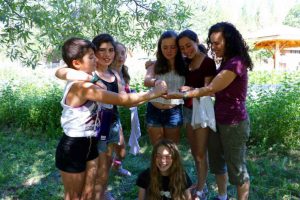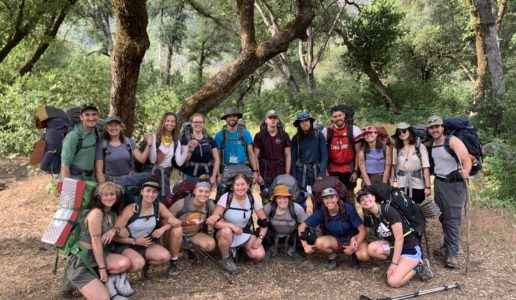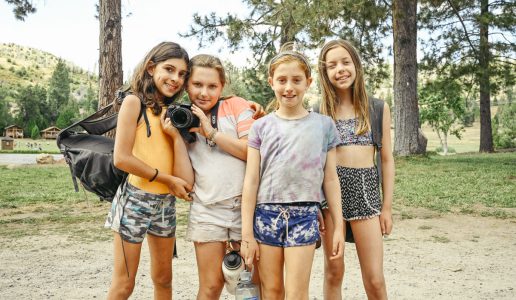The Blessing of a Raisin
By Rabbi Mychal Copeland
A raisin has never tasted so good!
…called out a camper in our Ruach/Spirit block.
This summer’s Jewish theme at Tawonga is “Hineini,” which means “I am present.” Many biblical heroes, notably Moses at the burning bush, respond to a challenge or opportunity by proclaiming, “Hineini!”: I am here, and I am spiritually ready. This week, every camper learned how to cultivate a state of “Hineini” through a mindful eating practice.
The hardest part for most of them was that when they were handed a raisin, they were instructed to refrain from eating it until the end of the exercise to get the most out of the experience. We placed a raisin in the palm of their hands and asked them to contemplate every aspect of the morsel. What does it feel like? Smell like? What were the physical forces in the universe that made it possible for this bit of sustenance to arrive into our hands? Who were the people who contributed to its creation?
Campers talked about the laborers in the grapevines, the wind, sun and rain, the workers at Sysco’s plant who boxed them up, the truck drivers who brought them to Camp. They were especially cognizant of the water necessary to sustain the vines amidst California’s water crisis. What a miracle to be holding this piece of food that was the result of so many complicated forces!
Finally, we thought about whether the food about to be consumed came from a tree or the ground so we could say a Jewish blessing before eating it. Pausing to think about where our food comes from and choosing either traditional Jewish words or creating our own prayers can turn every eating experience into a moment of Hineini. Prayer can be a ritual reminder in a fast-paced world to stop for a moment, bringing to mind all of the varied forces that went into the production of that bite of food.
When asked about the experience, one camper commented,
It really made me appreciate the raisin a lot more, because we stopped and thought about where it came from. I never thought about what it takes to get a simple raisin to a box.
Others remarked on the fruit bursting with more sweetness than they usually notice. And in a few rare cases, kids who previously hated raisins reported liking them for the first time. Some remarked that they felt “Hineini” in their bodies after trying out this practice. The campers thought about other moments that seem to pass by unnoticed in their daily lives that they could mark as notable and sacred, followed by the creation of their own bunk prayers.
Some people are naturally inclined toward Hineini. Most of us struggle to slow life down and be present for the moments large and small that make up our complicated lives. Watching the campers experience this exercise reminded me that being present or some might even say, “spiritual,” is not necessarily an inborn character trait with which we are either gifted or denied.
Most people need to cultivate those skills, but they are completely learnable and need to be reinforced throughout our lives. This sense of connectedness to ourselves and the world around us is available whether or not we grew up within a religious tradition or with more than one background.
Here at Camp, kids are learning that Jewish prayer is one tool for cultivating that mindset we have at our fingertips. In past years, my own kids have returned from Camp Tawonga wanting to sing the “hamotsi” prayer of thanks for bread at our home table. I believe this was in part because there was such a boisterous energy in the Dining Hall when hundreds of kids sang the words together.
But perhaps they also unwittingly wanted to bring it home because the rote repetition of this prayer three times a day provided an automatic moment of reflection and pause, lending an aura of the sacred to a monotonous, daily occurrence. This is just one of the ways that campers at Tawonga are learning the tools to be more present in their lives, more attuned to who they are becoming.
This post is part of our “Shablog” series on The Pipeline, dedicated to all things Jewish at Tawonga, shared on Shabbat. See last week’s Shablog post by Genevieve, our Director of Jewish Programming.


